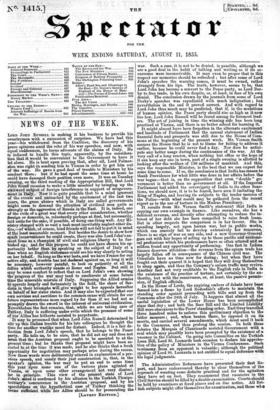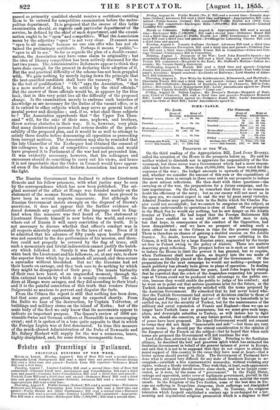The Administrative Reformers have presented their first Re- port, and
have endeavoured thereby to clear themselves of the reproach of wanting some definite practical end for the agitation they have set on foot. They recommend that vacancies in the Civil Service should be filled by a double examination. Courts should be held by examiners at fixed places and on due notice. All Bri- tish subjects might offer themselves for examination, and those who passed as primarily qualified should receive a certificate entitling them to be entered for competitive examination before the metro- politan department. It.is proposed that the ,course of -this lattbr examination should, as regards each particular department of tius service, be defined by the chief of such department, and the exami- nation ought to be "open 'and competitive. What the Association mean by the adjective "open" is not very clear. It cannot mean "open to all comers," because no one can offer who has not ob- tained the preliminary certificate. Perhaps it means " public,"— " open to all to see." So far as regards the plan of a double exami- nation, the Association may have some claim to originality ; but the idea of literary competition has been aotively discussed for the last two years. The Administrative Reformers appear to think they have done enough for the present in declaring their adoption of it. itt4 the real practical difficulty of the scheme has not been grappled 'With. We gain nothing by merely, laying down the principle that the best-qualified candidate shall have the vacancy. What is to be the test of qualification? "Oh!" says the Association, "that ia a mere matter of detail, to be settled by the chief officials." But the answer of those officials would be, as appears by the blue book, that in this very point lies all the difficulty of the proposed change. Is the examination merely to embrace such branches of knowledge as are necessary for the duties of the vacant office, or is it to extend to other subjects which may serve as general tests of mentall power and discipline ; and, if so, what shall those subjects, be ? The Association apprehends that "the -Upper Ten Thou- sand" will, for the sake of their sons, nephews, and brothers, throw serious obstacles in their way. It is, however, very plain that many disinterested persons feel serious doubts of the practi- cability of the proposed plan, and it would be as well to attempt to satisfy those doubts before denouncing all opposition as proceeding from corrupt motives. The Association may also be reminded that the late Chancellor of the Exchequer had obtained the consent of his colleagues to a plan of competitive examination, and would have proposed it to Parliament if the war had not prevented him. It was evidently necessary, however, that his colleagues and successors should do something to carry out his views, and hence it is not improbable that the Order in Council would have appear- ed even if the Administrative Reform Association had never seen the light.



























